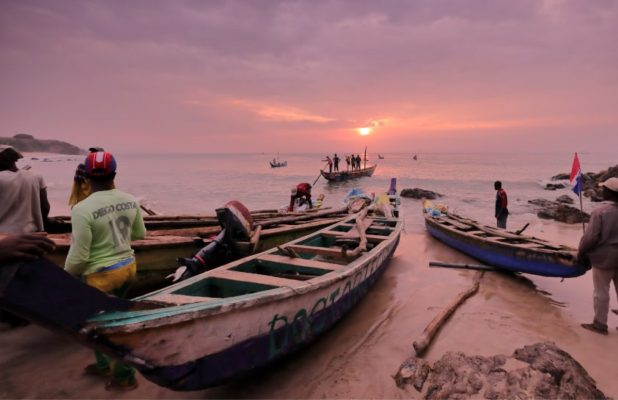Protecting small-scale fishers’ human rights in the face of climate change

Hub early career researcher, Julia Nakamura, was invited by the Indonesian national research organisation, Badan Riset dan Inovasi Nasional (BRIN), to contribute to an online discussion panel on “Climate change and small-scale fisheries (SSF)” on 23rd September 2022. This blogpost summarises key messages from her presentation.
The event was part of the contribution by BRIN to the 2022 International Year of Artisanal Fisheries and Aquaculture. At the event, Julia Nakamura explored how international law, including non-binding instruments such as the 2014 Voluntary Guidelines for Securing Sustainable Small-Scale Fisheries in the Context of Food Security and Poverty Eradication (SSF Guidelines) and the 2018 UN Declaration on the Rights of Peasants and Other People Working in Rural Areas (UNDROP), protect small-scale fishers in the context of climate change and related issues impacting coastal areas and fisheries resources.
She emphasised that the SSF Guidelines call upon States and non-State actors to develop climate change policies and plans in full consultation with fishing communities, and to make available transparent access to adaptation funds. She also underscored UNDROP provisions that recognise the right of small-scale fishers to participate in the design and implementation of climate change policies, including through the respectful integration of their traditional knowledge, and their right to adequate training that covers climate change issues and weather-related events.
She also reported that often climate change laws and policies do not expressly mention fisheries and rarely small-scale fisheries, with few fisheries policies (e.g. Gambia) addressing climate change. She noted that small-scale fisheries are normally linked with coastal, vulnerable, local or traditional communities in relation to adaptation measures (e.g., Kenya, Brazil). Against this background, she recommended effectively addressing climate change and preventing its negative impacts on small-scale fishers by protecting small-scale fishers’:
- Human right to life, property, tenure and culture (see also here)– all which are threatened by climate-related disasters such as sea level rise and extreme weather events;
- Human right to adequate food, which is threatened in particular by the decrease in the availability of fish stocks, depletion of habitats and ecosystems; and
- Human right to a healthy environment, which is threatened in particular by ocean warming, acidification and decrease in ecosystems services.
Ongoing partnerships and research
Julia has been a key contributor to the Hub’s partnerships with FAO, UN Office of the High Commissioner for Human Rights and others during IYAFA (see here and here), including by:
- Co-authoring a Hub research paper on Small-scale fishers’ human rights under the SSF Guidelines and UNDROP;
- Speaking on “the protection of human rights of small-scale fishers and their communities in the climate change context” at the 2022 Summer/Winter School for Human Rights & the Environment hosted by the Global Network for Human Rights and the Environment (GNHRE) and the UN Environment Programme (UNEP). See the recording here.
- Co-developing an FAO e-learning course “Legal and policy considerations for sustainable small-scale fisheries.”
- Contributing to The International Journal of Marine and Coastal Law’s Hub-led special issue on “Ocean-Based Action: The Ocean-Climate Nexus and Human Rights. Julia is co-authoring an article with Mitchell Lennan on the extent to which international law has addressed climate change and human rights in the context of small-scale fisheries, including role of regional fisheries management organisations.
Photo by: